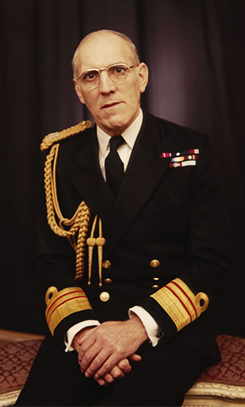James Watt (Royal Navy officer)
British Royal Navy officer
Sir James Watt (14 October 1914 – 27 December 2009) was a distinguished officer in the Royal Navy and served as the Surgeon-General of the British Armed Forces. His career spanned several decades, during which he made significant contributions to military medicine and naval healthcare.
Early Life and Education[edit | edit source]
James Watt was born in Morley, West Yorkshire, England. He attended local schools before pursuing higher education in medicine. Watt studied at the University of Leeds, where he earned his medical degree. His early interest in medicine and service led him to join the Royal Navy as a medical officer.
[edit | edit source]
Watt's naval career began in the late 1930s. He served on various ships and naval establishments, gaining experience in military medicine. During World War II, Watt was stationed on several naval vessels, providing medical care to sailors and marines. His service during the war was marked by dedication and skill, earning him recognition and promotions.
Post-War Service[edit | edit source]
After the war, Watt continued his career in the Royal Navy, taking on increasingly senior roles. He was appointed as the Director of Naval Medical Services, where he oversaw the health and medical readiness of naval personnel. His leadership in this role was instrumental in modernizing naval medical practices and improving healthcare delivery within the service.
Surgeon-General of the British Armed Forces[edit | edit source]
In 1972, Watt was appointed as the Surgeon-General of the British Armed Forces, the highest medical position in the British military. In this capacity, he was responsible for the medical services of all branches of the armed forces, including the British Army and the Royal Air Force. Watt's tenure as Surgeon-General was marked by efforts to integrate medical services across the military and improve the quality of care for service members.
Later Life and Legacy[edit | edit source]
After retiring from the Royal Navy, Watt remained active in medical and military circles. He was involved in various veterans' organizations and continued to advocate for improvements in military healthcare. Watt's contributions to military medicine were recognized with several honors, including a knighthood.
Related Pages[edit | edit source]
Search WikiMD
Ad.Tired of being Overweight? Try W8MD's physician weight loss program.
Semaglutide (Ozempic / Wegovy and Tirzepatide (Mounjaro / Zepbound) available.
Advertise on WikiMD
|
WikiMD's Wellness Encyclopedia |
| Let Food Be Thy Medicine Medicine Thy Food - Hippocrates |
Translate this page: - East Asian
中文,
日本,
한국어,
South Asian
हिन्दी,
தமிழ்,
తెలుగు,
Urdu,
ಕನ್ನಡ,
Southeast Asian
Indonesian,
Vietnamese,
Thai,
မြန်မာဘာသာ,
বাংলা
European
español,
Deutsch,
français,
Greek,
português do Brasil,
polski,
română,
русский,
Nederlands,
norsk,
svenska,
suomi,
Italian
Middle Eastern & African
عربى,
Turkish,
Persian,
Hebrew,
Afrikaans,
isiZulu,
Kiswahili,
Other
Bulgarian,
Hungarian,
Czech,
Swedish,
മലയാളം,
मराठी,
ਪੰਜਾਬੀ,
ગુજરાતી,
Portuguese,
Ukrainian
Medical Disclaimer: WikiMD is not a substitute for professional medical advice. The information on WikiMD is provided as an information resource only, may be incorrect, outdated or misleading, and is not to be used or relied on for any diagnostic or treatment purposes. Please consult your health care provider before making any healthcare decisions or for guidance about a specific medical condition. WikiMD expressly disclaims responsibility, and shall have no liability, for any damages, loss, injury, or liability whatsoever suffered as a result of your reliance on the information contained in this site. By visiting this site you agree to the foregoing terms and conditions, which may from time to time be changed or supplemented by WikiMD. If you do not agree to the foregoing terms and conditions, you should not enter or use this site. See full disclaimer.
Credits:Most images are courtesy of Wikimedia commons, and templates, categories Wikipedia, licensed under CC BY SA or similar.
Contributors: Prab R. Tumpati, MD

